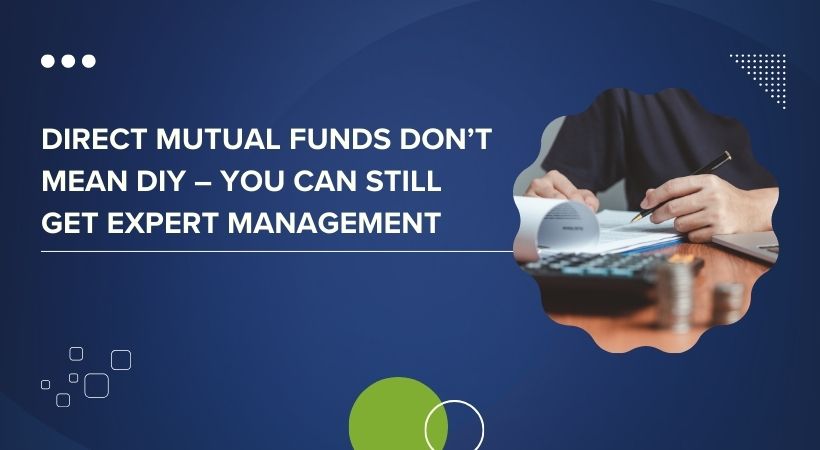The term Direct Mutual Fund often triggers one reaction: “DIY investing.”
Many assume that going direct means they’ll be left to research, track, and rebalance everything on their own. For those uncomfortable managing portfolios solo, this perception becomes a barrier.
But here’s the good news: you don’t have to go it alone.
You can absolutely invest in direct mutual funds and still benefit from expert management—without paying traditional distributor commissions or high advisory fees.
Let’s explore how.
What are Direct Mutual Funds?
Direct plans are mutual fund schemes purchased directly from the Asset Management Company (AMC), with no distributor or agent in between. This removes the commission from the expense ratio—resulting in lower costs and higher returns over time.
The fund, fund manager, portfolio—everything remains the same as the regular plan. The only difference? No intermediary costs.
But What If You Want Guidance?
If you’re not confident picking funds, tracking performance, or rebalancing portfolios yourself—there are now professional services that offer expert-led management while still investing through direct plans.
Here are your options:
1. Portfolio Management Services (PMS) with Direct Mutual Funds
Services like PriceBridge MFDirect PMS curate managed portfolios made up of direct mutual funds.
What do you get?
- A research-driven, advisor-curated basket of direct mutual funds
- Active rebalancing, risk management, and asset allocation
- Transparent fee structure (no commission-based incentives)
- Optimized for alpha generation over benchmarks
The best part? You get expert management + cost efficiency—a rare combination that was earlier only available to large HNIs or institutions.
2. SEBI-Registered Investment Advisors (RIAs)
RIAs offer fee-only advisory services. They help:
- Create goal-based investment strategies
- Recommend the right mix of direct mutual funds
- Guide rebalancing and reviews periodically
Since they don’t earn through commissions, their advice is unbiased and aligned with your financial goals.
You follow their guidance and execute the investments in direct funds yourself or via online platforms.
3. Goal-Based Robo-Advisory Platforms
Some tech-driven investment platforms now offer automated advice using algorithms, backed by expert teams. These platforms:
- Create portfolios of direct funds
- Offer dynamic rebalancing
- Align investments to risk appetite and goals
They’re ideal for investors who want automation with guidance, minus manual tracking.
So, Direct Doesn’t Mean Alone
The myth that direct mutual fund investing equals solo investing is outdated.
Today’s evolved platforms, advisors, and PMS offerings give you a hybrid model:
✅ Expert-driven
✅ Low-cost
✅ Transparent
✅ Customizable to your needs
In fact, managed direct mutual fund portfolios have emerged as a high-performance alternative to regular plans and traditional PMS, especially for investors looking for long-term alpha with lower costs.
Conclusion
If you’ve avoided direct mutual funds thinking you have to “do everything yourself,” it’s time to re-evaluate. Today’s financial landscape offers you the best of both worlds—professional expertise + cost savings.
Whether it’s through PMS, an RIA, or a robo-advisory model, you don’t have to sacrifice quality guidance to benefit from the lower expense of direct funds.
If you want expert help without the high costs, explore options like managed direct mutual fund portfolios. You could save lakhs in fees over the years—while still investing like a pro.
Author: Swapnil Kulkarni
Co-Founder, PriceBridge – A PMS of Ayan Analytics Pvt. Ltd.
Swapnil Kulkarni has 17+ years of experience in wealth management and is a CNBC TV18 Financial Advisor Awards nominee (2010). He specializes in managed mutual fund strategies and has been instrumental in developing low-cost, high-value PMS offerings for long-term investors.




